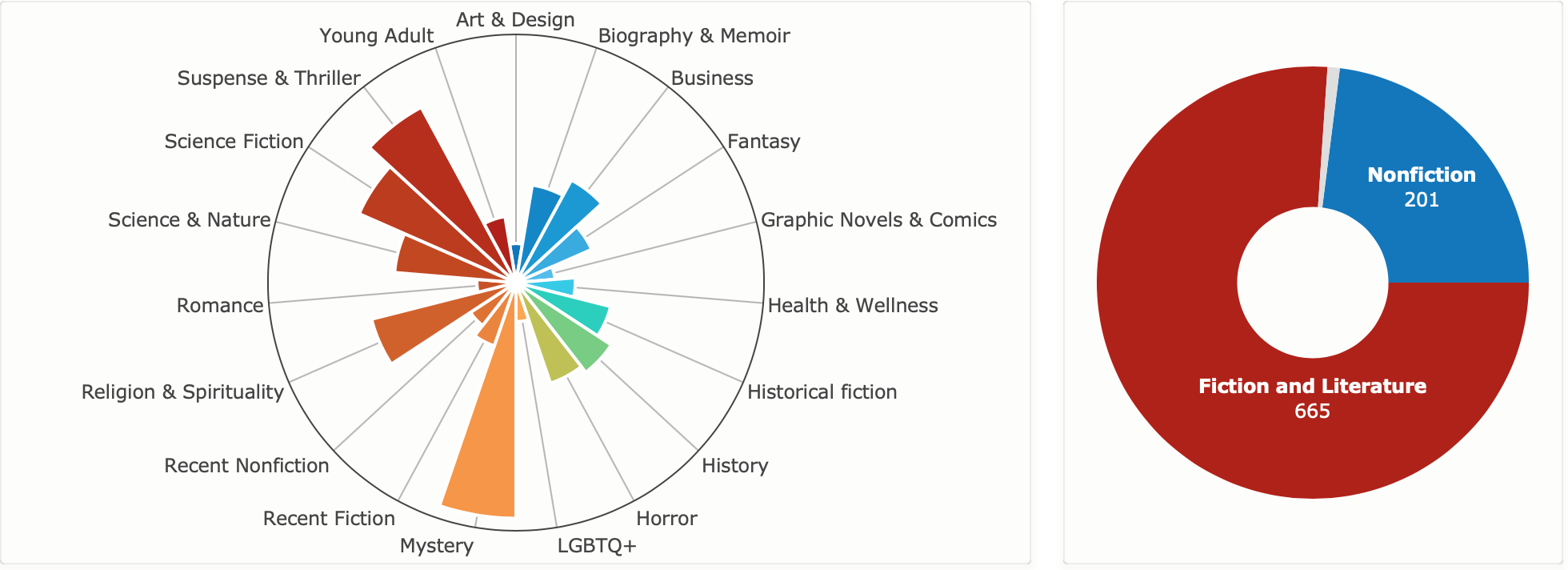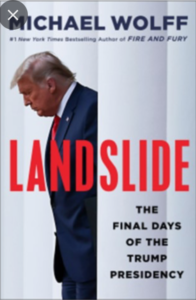This might not be a new feature but I just stumbled upon it today.

Lots more about my taste in books here.
Category Archives: Books
Tiny machines trying to kill us?
“The Berserker series is a series of space opera science fiction short stories and novels by Fred Saberhagen, in which robotic self-replicating machines strive to destroy all life. […] The Berserkers’ bases are capable of manufacturing more and deadlier Berserkers as the need arises.” (Wikipedia)
I read my first Berserker story in the late 60s so, 50+ years ago? What if the COVID-19 virus (all viruses?) is a form of intelligence whose purpose/mission/raison d’être is to destroy all human life? Is the COVID-19 virus really a tiny Berserker machine?
Speaking of science fiction…
We won’t see the first movies about the COVID-19 pandemic until it’s over, right? But if it’s never really over… I’ll wager some early “treatments” are already being pitched. There have been so many movies about viruses and pandemics (link below), what’s the fresh take?
I don’t think you can make a movie about the COVID-19 pandemic of 202(?) that doesn’t have vax-deniers and conspiracy nuts as a major plot element.
“War is cruelty and you cannot refine it.”
I recently finished Battle Cry of Freedom by James M. McPherson, considered by many the best single-volume history of the American Civil War. I wouldn’t know where to begin to tell you how much I enjoyed this book. We all know how the story ends, right, but I was on the edge of my seat till the final page. The mark of a truly great story-teller.
We all know about Union general William T. Sherman’s burning of Atlanta and his “march to the sea.” My simplistic Hollywood understanding of that chapter in the war was changed by this book, especially by this excerpt from Sherman’s memoirs.
“War is cruelty and you cannot refine it,” Sherman had told Atlanta’s mayor after ordering the civilian population expelled from the occupied city. But “when peace does come, you may call on me for anything. Then will I share with you the last cracker.” Until then, though, “we are not only fighting hostile armies, but a hostile people, and must make old and young, rich and poor, feel the hard hand of war.” Union armies must destroy the capacity of the southern people to sustain the war. Their factories, railroads, farms—indeed their will to resist—must be devastated. “We cannot change the hearts of those people of the South, but we can make war so terrible . [and] make them ‘so sick of war’ that generations would pass away before they would again appeal to it.”
— Memoirs by William T. Sherman
The passage reminded me of a passage from a novel by Robert K. Tanenbaum:
“Peace is best. You should make every sacrifice to secure peace. When you absolutely must go to war, however, you must try to kill all the enemy you can as quickly as you can, holding nothing back, until they have surrendered or you have been defeated utterly. It is a great fraud to think otherwise and it prolongs the agony. It would be better if people said, if we fight, we are going to boil babies in their own fat and blast the skin off nice old ladies, so they die slowly in great pain, and we are happy to do this, because what we fight for is so important. And if they conclude that it is not as important as that, then they should fight no more.”
— Robert K. Tanenbaum, Act of Revenge
War as video game
America’s Army is a video game “conceived by Colonel Casey Wardynski, the Army’s Chief Economist and a professor at West Point, the idea was to provide the public with a virtual soldier experience that was engaging, informative, and entertaining.” I got curious about this when I started seeing recruiting videos on some cable channels.
Not suggesting there is anything wrong with this approach, just that it got me thinking about what motivates a young man or woman to enlist in the military. Sebastian Junger alludes to this in his 2010 book, WAR.
“War is a lot of things and it’s useless to pretend exciting isn’t one of them. It’s insanely exciting. The machinery of war and the sound it makes and the urgency of its use and the consequences of almost everything about it are the most exciting things anyone engaged in war will ever know.”
“War is supposed to feel bad because undeniably bad things happen in it, but for a nineteen-year-old at the working end of a .50 cal during a firefight that everyone comes out of okay, war is life multiplied by some number that no one has ever heard of.”
So, is it “defending the homeland,” or the rush of surviving a firefight? Or something far more complicated?
Who would win a war between the Confederacy and the Taliban?
In a chapter titled Amateurs Go To War, Battle Cry of Freedom author James M. McPherson describes the South’s strategy:
“Jefferson Davis […] early in the war he seems to have envisaged a strategy like that of George Washington in the Revolution. Washington traded space for time; he retreated when necessary in the face of a stronger enemy; he counterattacked against isolated British outposts or detachments when such an attack promised success; above all, he tried to avoid full-scale battles that would have risked annihilation of his army and defeat of his cause. This has been called a strategy of attrition — a strategy of winning by not losing, of wearing out a better equipped foe and compelling him to give up by prolonging the war and making it too costly.”
I shared this with my friend (and historian) Bob Priddy, suggesting parallels to the Taliban strategy in Afghanistan. Bob’s reply:
You have come to a realization that the American military has not come to grips with since time began. We still fight our wars as if it was Breed’s Hill (not Bunker Hill), with one side barricaded and visible and the other side marching resolutely forward, sacrificing enough bodies that eventually the marching force will overcome the barricaded force by surviving numbers or will fall back, weakened and puzzled at the lack of success. It’ why we “lost” Vietnam. It’s why our two-decade effort at nation building in Afghanistan ultimately failed. The parallels of Vietnam and Afghanistan are marked.
We can’t make good Republicans (no snide comments about that phrase) and good Democrats out of people who see no such things, never have, and have never wanted them.
Jefferson Davis ultimately failed because he never had the cunning or the tools the Taliban has — although the white supremacist philosophy never lost. The Confederacy did. But white supremacy lurks in the philosophical underground tunnels of our time. We can be grateful that its ride into Washington in January was not as successful as the Taliban’s ride into Kabul.
Poor planning and inept leadership saved us this time.
Rigged election: 1854
“The Border War was a series of violent civil confrontations in Kansas Territory, and to a lesser extent in western Missouri, between 1854 and 1859. It emerged from a political and ideological debate over the legality of slavery in the proposed state of Kansas.” (Wikipedia)
From James McPherson’s Battle Cry of Freedom:
“In November 1854, (Missouri Senator David) Atchison and other prominent Missourians led an invasion, of “border ruffians” into Kansas to swell the vote for the proslavery candidate. Derided as “Pukes” by norther-born settlers, many of these lank, unshaven, unwashed, hard-drinking Missourians had little material interest in slavery but even less love for “those long-faced, sanctimonious Yankees” devoted to “sickly sycophantic love for the nigger.” The border ruffians won the first round. Casting more than 1,700 ballots that a subsequent congressional committee found to be fraudulent, they elected a proslavery delegate to Congress.”
The world you can perceive
“The world you can perceive is a very small world indeed. And it is entirely private. Take it to be a dream and be done with it.”
This bit of wisdom is from I Am That by Sri Nisargadatta Maharaj, a Hindu spiritual teacher who lived in Mumbai. I’ve thought about it a lot over the years. What is “the world I can perceive?” All perception — every experience — is via the five senses, so my world is what I can see, hear, touch, taste and smell. Right here, right now. And it’s constantly changing. So my world is a tiny sphere of sensations that is unique to me. Everything else is conceptual, existing only in my head.
I don’t remember where I read the phrase, “Consciousness creates reality,” but that seems ever more true as I age. If I look closely enough, most of my problems (worries, anxieties, fears) exist outside my tiny reality sphere.
Landslide
Landslide: The Final Days of the Trump Presidency by Michael Wolff
 To say that I “couldn’t put this book down,” is a time-worn cliche. And let’s face it, I can put just about any non-fiction book down. But I read this book in 24 hours which is really fast for me. I picked this book because I like the way Michael Wolff writes. I’ll let others judge his reporting, but the man knows how to tell a story. In Landslide, he comes as close as anyone could to making sense of the chaos and madness of Donald Trump’s final days. This book reads like a thriller (or a horror story).
To say that I “couldn’t put this book down,” is a time-worn cliche. And let’s face it, I can put just about any non-fiction book down. But I read this book in 24 hours which is really fast for me. I picked this book because I like the way Michael Wolff writes. I’ll let others judge his reporting, but the man knows how to tell a story. In Landslide, he comes as close as anyone could to making sense of the chaos and madness of Donald Trump’s final days. This book reads like a thriller (or a horror story).
The first book I read by Mr. Wolff was Burn Rate: How I Survived the Gold Rush Years on the Internet (1998).
“God might be like a wave front”
“God might be like a wave front, moving into an unknowable future; human souls might be like neurons, cells of God’s own intelligence. . . Whatever God was, Virgil seriously doubted that he worried too much about profanity, sex, or even death.”
— Rough Country (John Sandford)
“A new America”
“Almost all historians agree that a major historical turning point took place between roughly 1968 and 1974—a “revolution,” a “renaissance,” a “fracture,” a “shock wave,” a point after which “everything changed,” creating a “new America.” Maurice Isserman and Michael Kazin, for example, argue that the Sixties ushered in a moment of historical rupture on the scale of the American Civil War, dividing the twentieth century into a pre- and post-Sixties world, a change from which “there is no going back, any more than the lost world of the antebellum South could have been restored after 1865.”
— The Upswing ( Robert D. Putnam)
